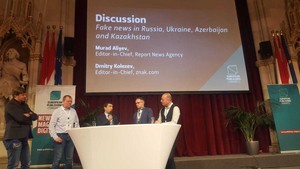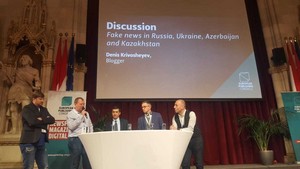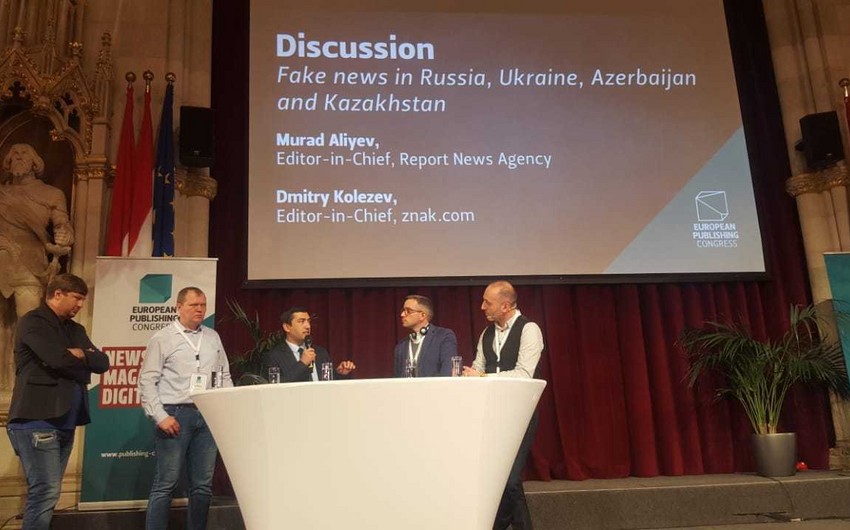Editor-in-chief of Report information Murad Aliyev is attending the European Newspaper Congress held in Austrian capital.
In period of escalation in Karabakh in April 2016, Armenian lobby was actively engaged in disseminating fake news, distorting the information in Armenia's favor, editor-in-chief of Report News Agency Murad Aliyev said speaking at the European Newspaper Congress held in Vienna, Austria.
"Just a couple of years ago the problem of fake news seemed unsolvable, since the readers believed any news they came across in social networks. Moreover, news portals were themselves engaged in disseminating fake news to attract more readers. In Azerbaijan, like in any other country with absolutely free access to internet, it took much time and efforts for people to start realizing the need to check facts that is engage in fact checking," Aliyev said.
He reminded that the opportunity to block websites in case of a deliberate dissemination of fake news appeared in Azerbaijan on the legislative level.
According to Murad Aliyev, the society itself must develop a critical attitude to misinformation.
"Most people are already tired of media bubbles, sensational assumptions. And in this situation the main responsibility lies with traditional media, information agencies for them to react promptly to fake news and search the truth," the editor-in-chief said.
All the same, Murad Aliyev also pointed to the danger of publishing false and fake news from the conflict areas.
"While false information about any person harms his political career or the news leads to business decay, fake news from the zones of hostilities endanger hundreds of lives. For example, during the escalation of Karabakh conflict in the Caucasus in April 2016, the Armenian lobby was actively engaged in disseminating fake news, distorting the information in Armenia's favor. Most fake news were brought to naught after the trips to the border areas were organized for the representatives of leading mass media, such as Reuters, Associated Press, Anadolu, Iranian television, RIA Novosti, Sputnik." Report's editor-in-chief said.
Deputy editor-in-chief of Russia's Znak.com Dmitriy Kolezev noted that the problem of fake news is relevant for European and American media outlets, but this topic is not No 1 for Russia.
"We had a very short period of independent press in the late 1980s-early 1990s, but, unfortunately, we did not manage to maintain freedom. Then the media outlets fell under the influence of big business," Kolezev said.
He noted that most of the Russian media get financial support of the authorities especially in the regions and, one way or another, they protect the interests of the powers.
В свою очередь главный редактор украинского издания Цензор.нет Сергей Головнов выразил мнение, что фейк-ньюс является следствием более глобальных проблем, которые сейчас есть в Украине.
On his part, editor-in-chief of Ukraine's Censor.net Sergey Golovnov voiced the opinion that fake news are the result of bigger global problems existing in Ukraine.
He said it is difficult for independent media to compete the media outlets financed by olygarchs, since such media do not need to earn money.
Blogger from Kazakhstan Deniz Krivosheyev noted that almost anyone can form a news today, and media outlets due to the nature and limited law simply cannot react promptly.
"And sometimes interpretation of a news that appear on information resources such as Facebook, Instagram and many others, is personalized by the author of the news. In general, we mean fake news as a source of attracting traffic to any resource," Krivosheyev said.
Like every year, this year's conference also took place with the sponsorshop of JTI (Japan Tobacco International). Participation of Azerbaijani journalists in the conference became possible with the support of the company's Azerbaijan office.




 https://static.report.az/photo/57471358-50a4-43cd-93a6-986560c29e85.jpg
https://static.report.az/photo/57471358-50a4-43cd-93a6-986560c29e85.jpg

